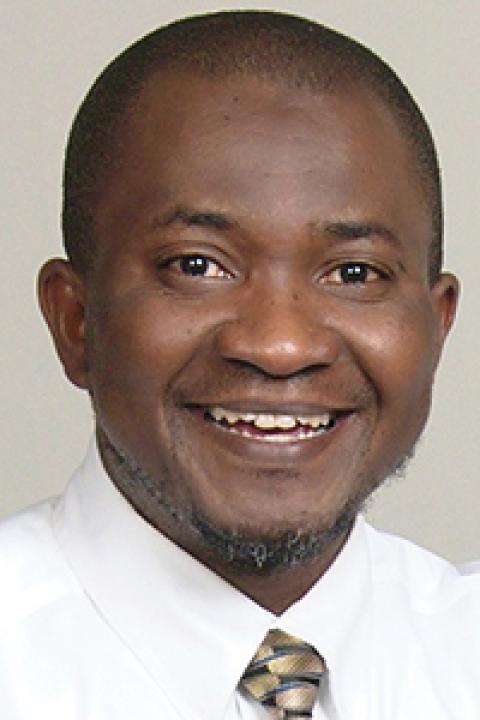Electrical Engineering Research and Laboratories
Research
UTC's Electrical Engineering program stands out as one of the most comprehensive and well-rounded programs in the field. It focuses on bridging theoretical knowledge with real-world applications, equipping students with the skills needed for a successful career in electrical engineering. UTC's faculty consists of distinguished engineers who are dedicated to mentoring students and sharing their expertise. Notably, many of UTC’s electrical engineering faculty have secured funding from national and government organizations. The university’s MS in Electrical Engineering is accredited by ABET, ensuring it meets the highest standards of quality and excellence. Graduates of this program are highly sought after by employers, making it a valuable and competitive degree.
Faculty Research Areas

Dr. Raga Ahmed
Email: [email protected]
Research:
- Control systems and embedded controls
- Motion control
- Variable reluctance motor technology
- Engineering education

Dr. Sharief Babikir
Email: [email protected]
Research:
- Microelectronics
- Devices
- Circuits
- Embedded Systems
- Quantum devices

Dr. JW Bruce
Email: [email protected]
Research:
- Embedded systems design
- Sensor networks and IoT
- Digital hardware design
- Quantum logic and computing systems
- Engineering education

Dr. Vahid Disfani
Email: [email protected]
Research:
- Comprehensive feeder-wide optimal voltage control
- Effective grid integration and optimal market participation of distributed energy resources
- Distributed and multi-agent optimal power flow for microgrids with high penetrations of renewable energy
- Reliability assessment of microgrids
- Distributed algorithms for distribution systems state estimation

Dr. Ahmed H. Eltom
Email: [email protected]
Research:
- Energy efficient systems
- Energy conservation
- Power system protection
- Advanced motor modeling
- Fault analysis
- Power system analysis and protection

Dr. Abdelrahman Karrar
Email: [email protected]
Research Areas:
- Frequency and voltage-based load-shedding
- Static and dynamic voltage stability
- PMU based topology estimation
- Power system stabilizer design
- Power system bifurcation and maximum loadability investigations
- Power system steady-state
- Dynamic and transient modelling
- Nuclear power plant electrical system analysis
- Distribution system analysis with particular reference to ferroresonance and associated phenomena

Dr. Abdul R. Ofoli
Email: [email protected]
Research:
- Robotics and Unmanned Aerial Systems (UAS)
- Artificial Intelligence for Image Processing and Pattern Recognition
- Intelligent Control Systems (Fuzzy Logic, Neural Networks, Neuro-Fuzzy) for Motion Control, Robotics, and Power Systems
- Control and Optimization of Power Electronics and Electric Drives
- Modeling, Simulation, and Control of Sustainable Energy Systems (Photovoltaic and Wind Power)
- Development of Virtual Sensing Technologies

Dr. Donald Reising
Email: [email protected]
Research:
- Digital communications and signal processing
- Specific Emitter Identification (SEI) and Radio Frequency (RF) fingerprinting
- Next generations communications systems
- Automation of smart grid electrical disturbance categorization, identification, and learning
- Use of SEI, machine learning and signal processing in radiation effects characterization

Dr. Nurhidajat Sisworahardjo
Email: [email protected]
Research:
- Data analytics in power systems
- Generating unit asset valuation
- Load forecasting
- Distributed generation modeling and grid penetration
- Post-disturbance network reconfiguration
Laboratories
Teaching and Research Laboratories
The Department of Electrical Engineering prides itself on the state-of-the-art equipment in our teaching and research labs. The undergraduate program places a heavy emphasis on laboratories and design projects. There are six lab courses in the undergraduate curriculum and two additional lectures which feature a significant laboratory component.
Smart Grid and Protection Laboratory
Initially, this industrial grade laboratory is an effort by local utilities, local IEEE Power Engineering Society section, relay manufactures, and the University of Tennessee at Chattanooga to stimulate students’ interest in the power system field by building a modern microprocessor-based relay industry grade laboratory. The laboratory has been evolved in becoming state-of-the-art facility to train the current workforce in use of advanced technology for power applications and to prepare undergraduate and graduate students for future power industry needs.
The laboratory features the latest in power protection relays and test equipment, including transmission line protection relays with 61850 networked communications. It is composed of seven stations with state-of-the-art relays donated from well know relay manufactures such as ABB, GE Multilin, and Schweitzer Engineering Laboratories, such as line distance relay SEL 411L and GE D90 Plus, differential relay 487E, and transformer protection relay ABB TPU 2000R. These relay stations are set up with breaker simulators, GPS units, Phasor Measurement Units (PMUs), and residential smart meters. The testing equipment such as Omicron 256, Real-Time Digital Simulator, Opal-RT, are used for dynamic relay testing, IEC 61850 testing, and real time simulation of the power system. The GPS units are available for stamping data received from PMUs and relays for IEC 61850 testing.
In this laboratory students set the relays using a personal computer, application software, and communication processor. Relays are tested using SEL AMS low-level testing systems or Omicron CMC 256, and a Real-Time Digital Simulator. Students gain familiarity with test equipment and procedures when testing modern microprocessor-based multifunction transmission, generator, motor, and bus protection relays. Experience will be gained in configuring and operating test equipment (60Hz voltage and current signals, as well as digital representations of those signals), calculating test quantities, making connections between relay and test sets, and analyzing results including all available sources of fault records (relay targets and internal oscillographic records).
Students perform experiments on transmission, distribution, generator, and transformer protection. In this laboratory students are familiarized with overcurrent, overvoltage, distance, and differential relays as well as pilot relaying. They are able to set and test digital relays, select current and voltage transformers, determine relays and transformer taps, conduct research on power system protection, and test their protection design schemes in a laboratory environment.
ETAP/TVA Power Simulation Laboratory
The ETAP/TVA Power Simulation Laboratory, located in EMCS 402, is the result of a three-way partnership with TVA, Operation Technology, Inc. (OTI), and The University of Tennessee at Chattanooga. This state-of-the-art lab contains the latest in electrical power simulation system design and analysis software. The ETAP software, made available to the Department through a generous donation from OTI, is used by TVA and other electric power companies to drastically reduce the cost of design, analysis, maintenance, and operation of power systems.
TVA Power Engineering Laboratory
The Power Lab, located in EMCS 308, was furnished with the help of a grant from TVA, the Electric Power Research Institute (EPRI) and UTC. It consists of six Labvolt stations that support two undergraduate courses.
Each of the station as shown above features with dc motor/generator, four-pole squirrel-cage induction motor, three-phase synchronous motor/generator, resistive, inductive, and capacitive loads, single- and three-phase transformers, synchronizing module, power supply, four-quadrant dynamometer, and data acquisition and control interface.
Students are able to conduct various experiments on single- and three-phase power measurement with resistive and reactive loads configuration, transformer’s polarity, parameters, and characteristics, and ac/dc machine behavior and loading characteristics.
Students use a computer based system, a data acquisition interface module, and data management software to measure, observe, and analyze electrical and mechanical parameters in electrical machines and power systems. Students also observe waveforms displayed in the time and phasor domain, as shown above.
Power Electronics & Electric Drives Laboratory
The power electronics laboratory is built around a reconfigurable circuit board, termed the power-pole board, along with accessory daughter-boards design by the University of Minnesota. The board can be configured to work as a buck, boost, buck-boost, flyback or forward converter. The board can also be operated in voltage/current feedback mode using an external control circuit mounted on a daughter board which plugs into the power-pole Board.
In addition to the power board, high wattage resistor, power supplies, a multi-meter and differential probes were obtained to create a student work station. Currently, there are six work stations for the power electronics lab at UTC.
Above figure shows the hardware set used for the electric drives lab station which consists of a motor coupling system; power electronics drive board, and a DSP-based controller card. The motor coupling system contains the motor that needs to be characterized or controlled. The system has a mechanical coupling arrangement to couple two electric machines. The motor under test could be either a DC motor or three-phase induction motor or three-phase permanent-magnet AC (PMAC) motor. The motor demands a controlled pulse-width-modulated (PWM) voltage to run at controlled speed or torque which is generated by power electronics drive board.
EPB Electrical Circuits Laboratory
The bulk of the entry-level circuits labs are held in the Electrical Circuits Laboratory in EMCS 307. Stocked with electrical test equipment, including digital oscilloscopes, this lab exposed sophomore students of all engineering disciplines to fundamental electrical principles.
Instrumentation and Advanced Electronics Laboratory
In the Instrumentation and Advanced Electronics Lab in EMCS 310 are held courses in microprocessors and advanced electrical design.
Students are exposed to real-world design and instrumentation in the Electrical Systems Laboratory, using GE Programmable Logic Controllers (PLCs) and National Instruments LabVIEW to automate industrial tasks as part of the Electrical Engineering senior capstone design. The lab is located in EMCS 322.
Electrical Systems Laboratory
In this lab, located in EMCS 322, students are exposed to real-world design and instrumentation tools using Automation Direct Programmable Logic Controllers (PLCs) and National Instruments LabVIEW to automate industrial tasks as part of the Electrical Engineering senior capstone design.
Electrical Communication Laboratory
Utilizing the EMONA Tims system of educational communications equipment, the Electrical Communication Lab in EMCS 303 provides a hands-on environment for implementing a variety of radios.
Configurable Systems Laboratory
The Configurable System Lab in EMCS 305 is used for research in reconfigurable computing, software defined radio, and processor architectures. The latest in programmable logic devices and software development tools are used to create custom digital designs.